LayerZero Omnichain Applications & Omnichain Fungible Tokens
04 Feb 2025 | BlockchainLayerZero
Overview
이번 포스팅에서는 LayerZero를 사용하여 OApp(Omnichain Applications)과 OFT(Omnichain Fungible Tokens)를 배포하고 실행하는 과정을 설명합니다.
Getting Started with Contract Standards
LayerZero의 Contract Standards 를 사용하여 임의의 데이터, 토큰 등을 해당 프로토콜을 사용하여 전송할 수 있습니다.
- Omnichain Application (OApp): omnichain 메시징 및 구성을 위한 기본 contract 표준.
- Omnichain Fungible Token (OFT): ERC20 전송을 처리하고 지원하기 위해 구축된 OApp 확장.
- Omnichain Non-Fungible Token (ONFT): omnichain ERC721 전송을 처리하고 지원하기 위해 구축된 확장.
이 표준들은 LayerZero Endpoint contract를 통해 omnichain 메시지를 보내고, 받고, 구성하기 위한 공통 기능을 구현하고 있습니다.
OAppSender._lzSend:EndpointV2.send를 호출하여 byte 메시지를 보내는 Internal functionOAppReceiver._lzReceive:EndpointV2.lzReceive를 호출한 뒤 encoded message를 byte로 전달하는 internal function
Quickstart - Create Your First Omnichain App
Creating an OApp
아래 명령어를 사용하여 새 프로젝트를 생성합니다.
npx create-lz-oapp@latest
OApp Smart Contract
프로젝트를 생성하면 MyOApp.sol 컨트랙트가 있습니다.
// contracts/MyOApp.sol
// SPDX-License-Identifier: MIT
pragma solidity ^0.8.22;
import { Ownable } from "@openzeppelin/contracts/access/Ownable.sol";
import { OApp, MessagingFee, Origin } from "@layerzerolabs/oapp-evm/contracts/oapp/OApp.sol";
import { MessagingReceipt } from "@layerzerolabs/oapp-evm/contracts/oapp/OAppSender.sol";
contract MyOApp is OApp {
constructor(address _endpoint, address _delegate) OApp(_endpoint, _delegate) Ownable(_delegate) {}
// This is where the message will be stored after it is received on the destination chain
string public data = "Nothing received yet.";
/**
* @notice Sends a message from the source chain to a destination chain.
* @param _dstEid The endpoint ID of the destination chain.
* @param _message The message string to be sent.
* @param _options Additional options for message execution.
* @dev Encodes the message as bytes and sends it using the `_lzSend` internal function.
* @return receipt A `MessagingReceipt` struct containing details of the message sent.
*/
function send(
uint32 _dstEid,
// The message to be sent to the destination chain
string memory _message,
bytes calldata _options
) external payable returns (MessagingReceipt memory receipt) {
bytes memory _payload = abi.encode(_message);
receipt = _lzSend(_dstEid, _payload, _options, MessagingFee(msg.value, 0), payable(msg.sender));
}
/**
* @notice Quotes the gas needed to pay for the full omnichain transaction in native gas or ZRO token.
* @param _dstEid Destination chain's endpoint ID.
* @param _message The message.
* @param _options Message execution options (e.g., for sending gas to destination).
* @param _payInLzToken Whether to return fee in ZRO token.
* @return fee A `MessagingFee` struct containing the calculated gas fee in either the native token or ZRO token.
*/
function quote(
uint32 _dstEid,
string memory _message,
bytes memory _options,
bool _payInLzToken
) public view returns (MessagingFee memory fee) {
bytes memory payload = abi.encode(_message);
fee = _quote(_dstEid, payload, _options, _payInLzToken);
}
/**
* @dev Internal function override to handle incoming messages from another chain.
* @dev _origin A struct containing information about the message sender.
* @dev _guid A unique global packet identifier for the message.
* @param payload The encoded message payload being received.
*
* @dev The following params are unused in the current implementation of the OApp.
* @dev _executor The address of the Executor responsible for processing the message.
* @dev _extraData Arbitrary data appended by the Executor to the message.
*
* Decodes the received payload and processes it as per the business logic defined in the function.
*/
function _lzReceive(
Origin calldata /*_origin*/,
bytes32 /*_guid*/,
bytes calldata payload,
address /*_executor*/,
bytes calldata /*_extraData*/
) internal override {
data = abi.decode(payload, (string));
}
}
Configuration
hardhat.config.ts 에 배포할 네트워크에 대한 정보를 입력합니다.
networks: {
'avalanche-testnet': {
eid: EndpointId.AVALANCHE_V2_TESTNET,
url: process.env.RPC_URL_FUJI || 'https://rpc.ankr.com/avalanche_fuji',
accounts,
},
'amoy-testnet': {
eid: EndpointId.AMOY_V2_TESTNET,
url: process.env.RPC_URL_AMOY || 'https://polygon-amoy-bor-rpc.publicnode.com',
accounts,
},
}
.env.example 를 복사해 .env 를 만들고 .env를 수정합니다.
PRIVATE_KEY = your_private_key; // Required
RPC_URL_FUJI = your_fuji_rpc; // Optional but recommended
RPC_URL_AMOY = your_amoy_rpc; // Optional but recommended
Deploying Contracts
아래 명렁어를 이용하여 배포합니다.
npx hardhat lz:deploy

Configuration and wiring
이제 Chain간 Contract를 연결할 수 있는 준비가 되었습니다. 이를 위해 설정을 구성해야합니다. 해당 설정은 layerzero.config.ts 에 구성합니다.
// layerzero.config.ts
import {EndpointId} from '@layerzerolabs/lz-definitions';
import type {OAppOmniGraphHardhat, OmniPointHardhat} from '@layerzerolabs/toolbox-hardhat';
const fujiContract: OmniPointHardhat = {
eid: EndpointId.AVALANCHE_V2_TESTNET,
contractName: 'MyOApp',
};
const amoyContract: OmniPointHardhat = {
eid: EndpointId.AMOY_V2_TESTNET,
contractName: 'MyOApp',
};
const config: OAppOmniGraphHardhat = {
contracts: [
{
contract: fujiContract,
},
{
contract: amoyContract,
},
],
connections: [
{
from: fujiContract,
to: amoyContract,
},
{
from: amoyContract,
to: fujiContract,
},
],
};
export default config;
설정을 다 구성 했다면 아래 명령어를 이용하여 contract들을 연결할 수 있습니다.
npx hardhat lz:oapp:wire --oapp-config layerzero.config.ts
결과적으로 아래와 같이 출력 됩니다.

Sending Your First Message
이제 실제 메시지를 보내기 위해 ts파일로 script를 구성합니다.
tasks/sendMessage.ts 로 새 파일을 만들고 아래 코드를 입력합니다.
// tasks/sendMessage.ts
import {task} from 'hardhat/config';
import {HardhatRuntimeEnvironment} from 'hardhat/types';
import {Options} from '@layerzerolabs/lz-v2-utilities';
export default task('sendMessage', 'Send a message to the destination chain')
.addParam('dstNetwork', 'The destination network name (from hardhat.config.ts)')
.addParam('message', 'The message to send')
.setAction(async (taskArgs, hre: HardhatRuntimeEnvironment) => {
const {message, dstNetwork} = taskArgs;
const [signer] = await hre.ethers.getSigners();
// Get destination network's EID
const dstNetworkConfig = hre.config.networks[dstNetwork];
const dstEid = dstNetworkConfig.eid;
// Get current network's EID
const srcNetworkConfig = hre.config.networks[hre.network.name];
const srcEid = srcNetworkConfig?.eid;
console.log('Sending message:');
console.log('- From:', signer.address);
console.log('- Source network:', hre.network.name, srcEid ? `(EID: ${srcEid})` : '');
console.log('- Destination:', dstNetwork || 'unknown network', `(EID: ${dstEid})`);
console.log('- Message:', message);
const myOApp = await hre.deployments.get('MyOApp');
const contract = await hre.ethers.getContractAt('MyOApp', myOApp.address, signer);
// Add executor options with gas limit
const options = Options.newOptions().addExecutorLzReceiveOption(200000, 0).toBytes();
// Get quote for the message
console.log('Getting quote...');
const quotedFee = await contract.quote(dstEid, message, options, false);
console.log('Quoted fee:', hre.ethers.utils.formatEther(quotedFee.nativeFee));
// Send the message
console.log('Sending message...');
const tx = await contract.send(dstEid, message, options, {value: quotedFee.nativeFee});
const receipt = await tx.wait();
console.log('🎉 Message sent! Transaction hash:', receipt.transactionHash);
console.log(
'Check message status on LayerZero Scan: https://testnet.layerzeroscan.com/tx/' +
receipt.transactionHash,
);
});
또한 hardhat.config.ts 에도 위에서 만든 파일을 Import 합니다.
// hardhat.config.ts
// (...)
import {EndpointId} from '@layerzerolabs/lz-definitions';
import './tasks/sendMessage'; // Import the task
이후 아래 명령어로 cross-chain message를 보낼 수 있습니다.
npx hardhat sendMessage --network avalanche-testnet --dst-network amoy-testnet --message "Hello Omnichain World (sent from Avalanche)"
# 실제로는 amoy를 사용하지 않고 sepolia를 사용했음 (Gas fee 없어서)
npx hardhat sendMessage --network sepolia-testnet --dst-network avalanche-testnet --message "Hello Omnichain World (sent from Seploia)"
결과는 아래와 같습니다.
Sending message:
- From: 0x498098ca1b7447fC5035f95B80be97eE16F82597
- Source network: avalanche-testnet (EID: 40106)
- Destination: amoy-testnet (EID: 40267)
- Message: Hello Omnichain World (sent from Avalanche)
Getting quote...
Quoted fee: 0.004605311339306711
Sending message...
🎉 Message sent! Transaction hash: 0x47bd60f2710c2ec5a496c55c9763bd87fd4c599b541ad1287540fce9852ede65
Check message status on LayerzeRo Scan: https://testnet.layerzeroscan.com/tx/0x47bd60f2710c2ec5a496c55c9763bd87fd4c599b541ad1287540fce9852ede65
-
실패 ( avax → sepolia )



LayerZero V2 OFT

OFT는 모든 체인에 배포되어야 하며, 각 체인에서 토큰을 발행하고 전송할 수 있습니다.
각 체인간 전송하는 과정에서 기본적으로 Burn & Mint 처리가 됩니다.

만약 이미 존재하는 ERC20을 사용하여 OFTAdapter를 구성한 경우 Lock & Mint 처리가 됩니다.
Installation
아래 명령어로 OFT가 포함된 프로젝트를 생성할 수 있습니다.
npx create-lz-oapp

추가로 아래 명령어로 npm 패키지를 설치합니다.
pnpm add @layerzerolabs/oft-evm
OFT를 생성하려면, 토큰을 존재시키고자 하는 모든 체인에 OFT Contract를 배포해야 합니다.
이미 해당 체인에 토큰이 존재하는 경우, 해당 토큰의 중개 역할을 하는 Lock Box로서 OFT Adapter Contract를 배포할 수 있습니다.
기본적으로 OFT는 ERC20 규칙을 따르며, decimals 값을 18로 설정합니다. 다른 값을 사용하려면 컨트랙트에서 decimals() 함수를 오버라이드해야 합니다.
Deployment Workflow
-
OFT를 연결하려는 모든 체인에 배포
OFT를 생성하려면, 토큰을 존재시키고자 하는 모든 체인에 OFT 컨트랙트를 배포해야 합니다.
-
setPeer를 사용하여 체인 간 연결
OFT는 OApp을 확장하므로, OFT.setPeer를 호출하여 각 대상 체인의 컨트랙트를 허용 목록(whitelist)에 추가해야 합니다.
-
DVN(Decentralized Verification Network) 설정
블록 확인(block confirmations), 보안 임계값(security threshold), 실행자(Executor), 최대 메시지 크기(max message size), 송·수신 라이브러리(send/receive libraries) 등의 설정을 구성해야 합니다.
-
보안 및 실행자(Executor) 설정 스크립트 참고
보안 및 실행자 설정과 관련된 예제 스크립트는 “Security and Executor Configuration” 섹션에서 확인할 수 있습니다.
-
가스 설정 (권장 옵션)
OFT는 OAppOptionsType3을 상속받으므로, 사용자가 aOFT.send를 호출할 때 특정 가스 설정을 강제할 수 있습니다.
-
OFTAdapter를 사용하는 경우 (필수 설정)
OFTAdapter를 사용할 경우, 전송할 토큰의 양만큼 ERC20.approve를 호출하여 OFTAdapter가 ERC20 토큰을 사용할 수 있도록 승인해야 합니다.
Deploy
-
hardhat.config.ts구성본문에서는 amoy를 사용하지 않을거라 제거했음

- Mint function 추가
- 템플릿엔 mint가 별도로 없기 때문에 추가해 주어야 합니다.
- 프로덕션에서 사용하려면
onlyOwner같은 modifier 를 반드시 넣어주세요
// SPDX-License-Identifier: UNLICENSED pragma solidity ^0.8.22; import { Ownable } from "@openzeppelin/contracts/access/Ownable.sol"; import { OFT } from "@layerzerolabs/oft-evm/contracts/OFT.sol"; contract MyOFT is OFT { constructor( string memory _name, string memory _symbol, address _lzEndpoint, address _delegate ) OFT(_name, _symbol, _lzEndpoint, _delegate) Ownable(_delegate) {} // Mint function function mint(address to, uint256 amount) external virtual { _mint(to, amount); } } - 프로덕션에서 사용하려면
- 템플릿엔 mint가 별도로 없기 때문에 추가해 주어야 합니다.
-
빌드
pnpm install # Install dependencies pnpm compile # Compile contract
.env구성- Rename
.env.example->.env - Choose your preferred means of setting up your deployer wallet/account:
MNEMONIC="test test test test test test test test test test test junk" or... PRIVATE_KEY="0xabc...def"- Rename
-
배포
npx hardhat lz:deploy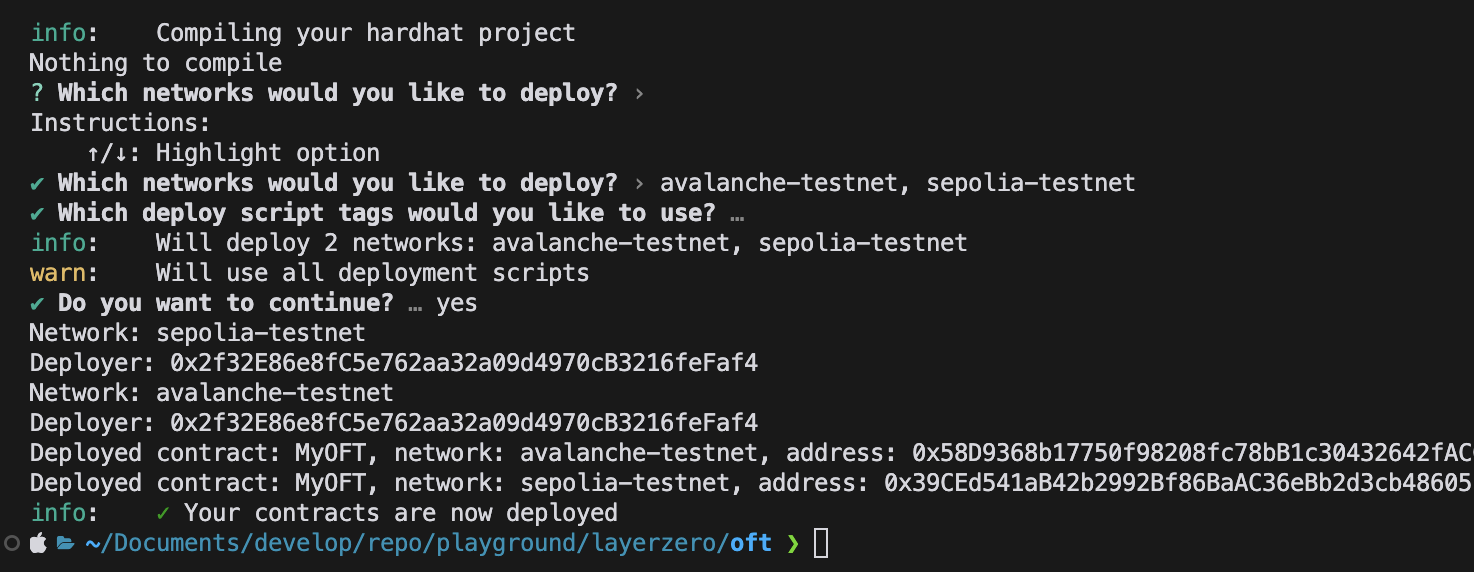
-
layerzero.config.ts구성실제 컨트랙트를 연결할 체인들을 구성
본문에서는 amoy를 사용하지 않아 제거했음
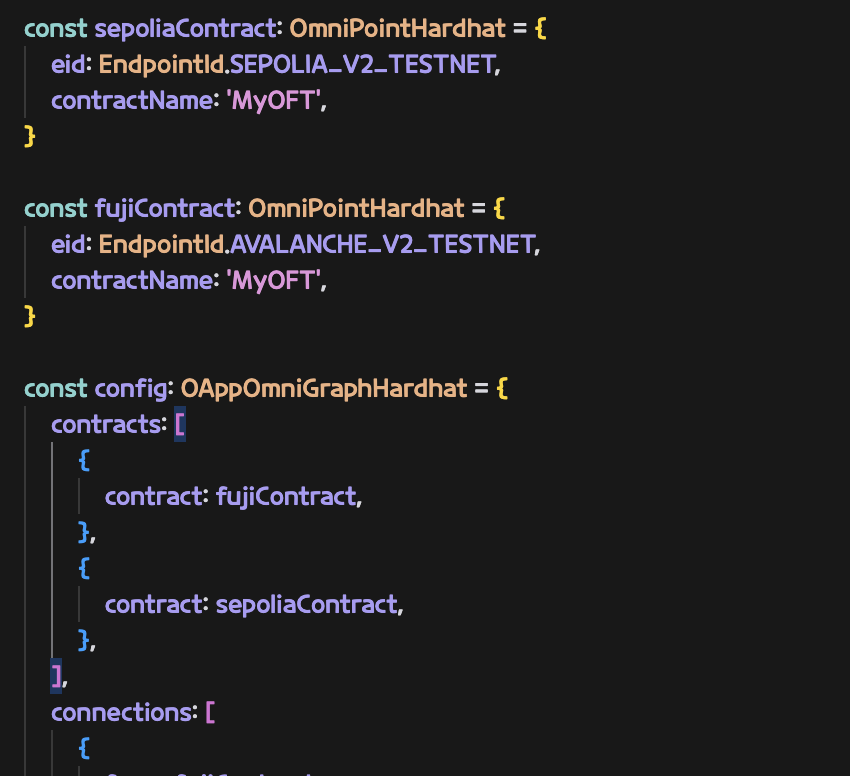
-
Contract wire
npx hardhat lz:oapp:wire --oapp-config layerzero.config.ts
- Mint Task 생성 후 실행
-
tasks/mint.ts// tasks/mint.ts import { task } from 'hardhat/config'; import { HardhatRuntimeEnvironment } from 'hardhat/types'; import { Options } from '@layerzerolabs/lz-v2-utilities'; export default task('mint', 'Mint a token to the destination chain') .addParam('amount', 'The amount of tokens to mint') .setAction(async (taskArgs, hre: HardhatRuntimeEnvironment) => { const { amount } = taskArgs; const [signer] = await hre.ethers.getSigners(); console.log('Minting tokens:'); console.log('- From:', signer.address); console.log('- Amount:', amount); const myOFT = await hre.deployments.get('MyOFT'); const contract = await hre.ethers.getContractAt('MyOFT', myOFT.address, signer); // Send the message console.log('Sending message...'); const tx = await contract.mint(signer.address, amount); const receipt = await tx.wait(); console.log('🎉 Tokens minted! Transaction hash:', receipt.transactionHash); }); -
hardhat.config.ts에 추가import { EndpointId } from '@layerzerolabs/lz-definitions' import "./tasks/mint" // 추가 // Set your preferred authentication method -
실행
npx hardhat mint --network sepolia-testnet --amount 10000000000000000000
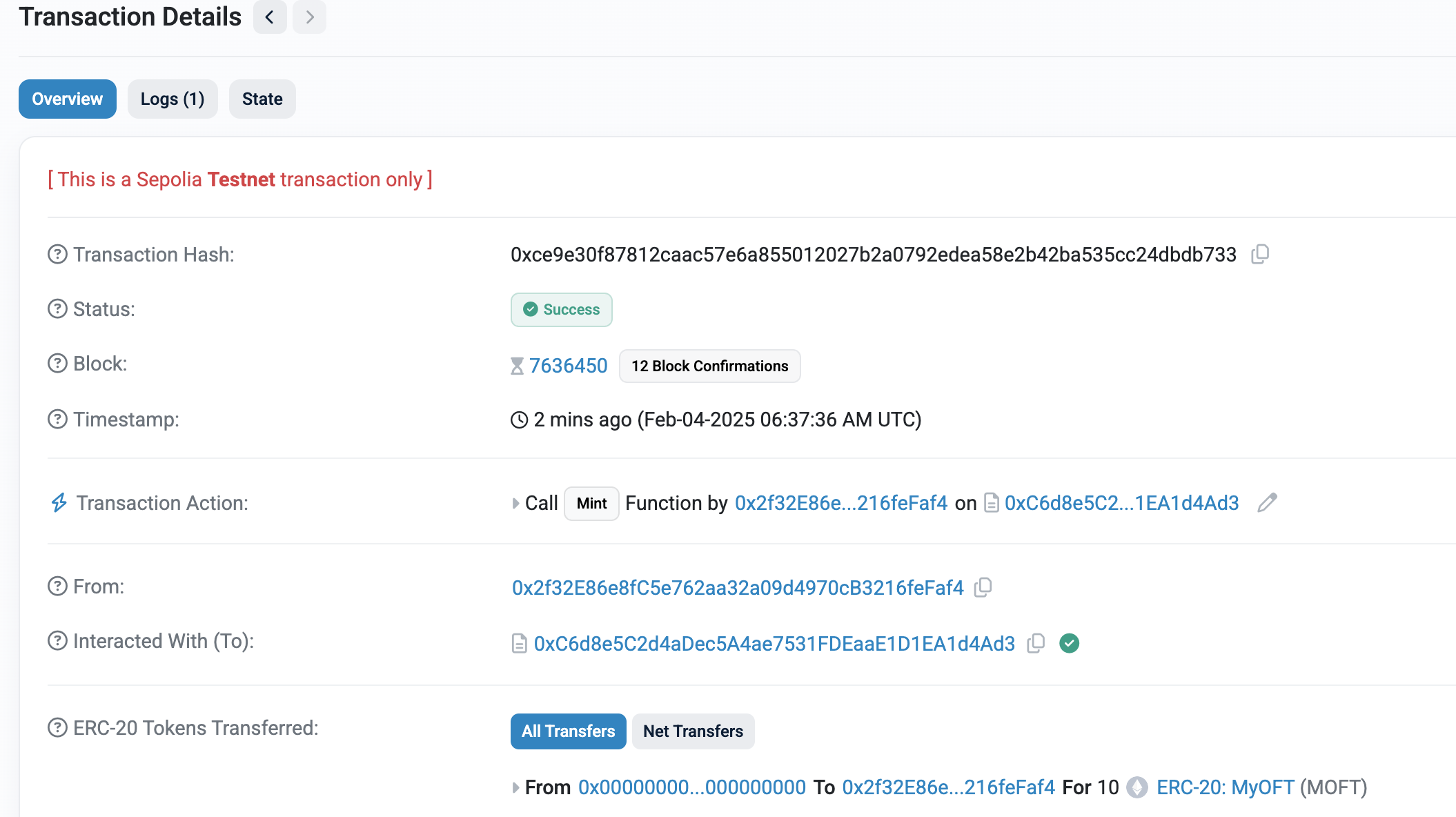
-
-
sendToken 생성 후 실행
// tasks/sendToken.ts import { task } from 'hardhat/config'; import { HardhatRuntimeEnvironment } from 'hardhat/types'; import { Options } from '@layerzerolabs/lz-v2-utilities'; export default task('sendToken', 'Send a token to the destination chain') .addParam('dstNetwork', 'The destination network name (from hardhat.config.ts)') .addParam('amount', 'The amount of tokens to send') .setAction(async (taskArgs, hre: HardhatRuntimeEnvironment) => { const { amount, dstNetwork } = taskArgs; const [signer] = await hre.ethers.getSigners(); const addressAsBytes32 = "0x0000000000000000000000002f32e86e8fc5e762aa32a09d4970cb3216fefaf4"; // Get destination network's EID const dstNetworkConfig = hre.config.networks[dstNetwork]; const dstEid = dstNetworkConfig.eid; // Get current network's EID const srcNetworkConfig = hre.config.networks[hre.network.name]; const srcEid = srcNetworkConfig?.eid; console.log('Sending message:'); console.log('- From:', signer.address); console.log('- Source network:', hre.network.name, srcEid ? `(EID: ${srcEid})` : ''); console.log('- Destination:', dstNetwork || 'unknown network', `(EID: ${dstEid})`); console.log('- Amount:', amount); const myOFT = await hre.deployments.get('MyOFT'); const contract = await hre.ethers.getContractAt('MyOFT', myOFT.address, signer); // Add executor options with gas limit const options = Options.newOptions().addExecutorLzReceiveOption(200000, 0).toBytes(); // Get quote for the message console.log('Getting quote...'); const sendParam = { dstEid: dstEid, to: addressAsBytes32, amountLD: amount, minAmountLD: amount, extraOptions: options, composeMsg: "0x00", oftCmd: "0x00" } const quotedFee = await contract.quoteSend(sendParam, false); console.log('Quoted fee:', hre.ethers.utils.formatEther(quotedFee.nativeFee)); // Send the message console.log('Sending tokens...'); const tx = await contract.send(sendParam, quotedFee, signer.address, {value: quotedFee.nativeFee}); const receipt = await tx.wait(); console.log('🎉 Tokens sent! Transaction hash:', receipt.transactionHash); console.log( 'Check token balance on LayerZero Scan: https://testnet.layerzeroscan.com/tx/' + receipt.transactionHash, ); });import { EndpointId } from '@layerzerolabs/lz-definitions' import "./tasks/mint" import "./tasks/sendToken" // 추가npx hardhat sendToken --network sepolia-testnet --dst-network avalanche-testnet --amount 1000000000000000000
-
아래와 같이 LayerZero Explorer에서도 확인할 수 있음
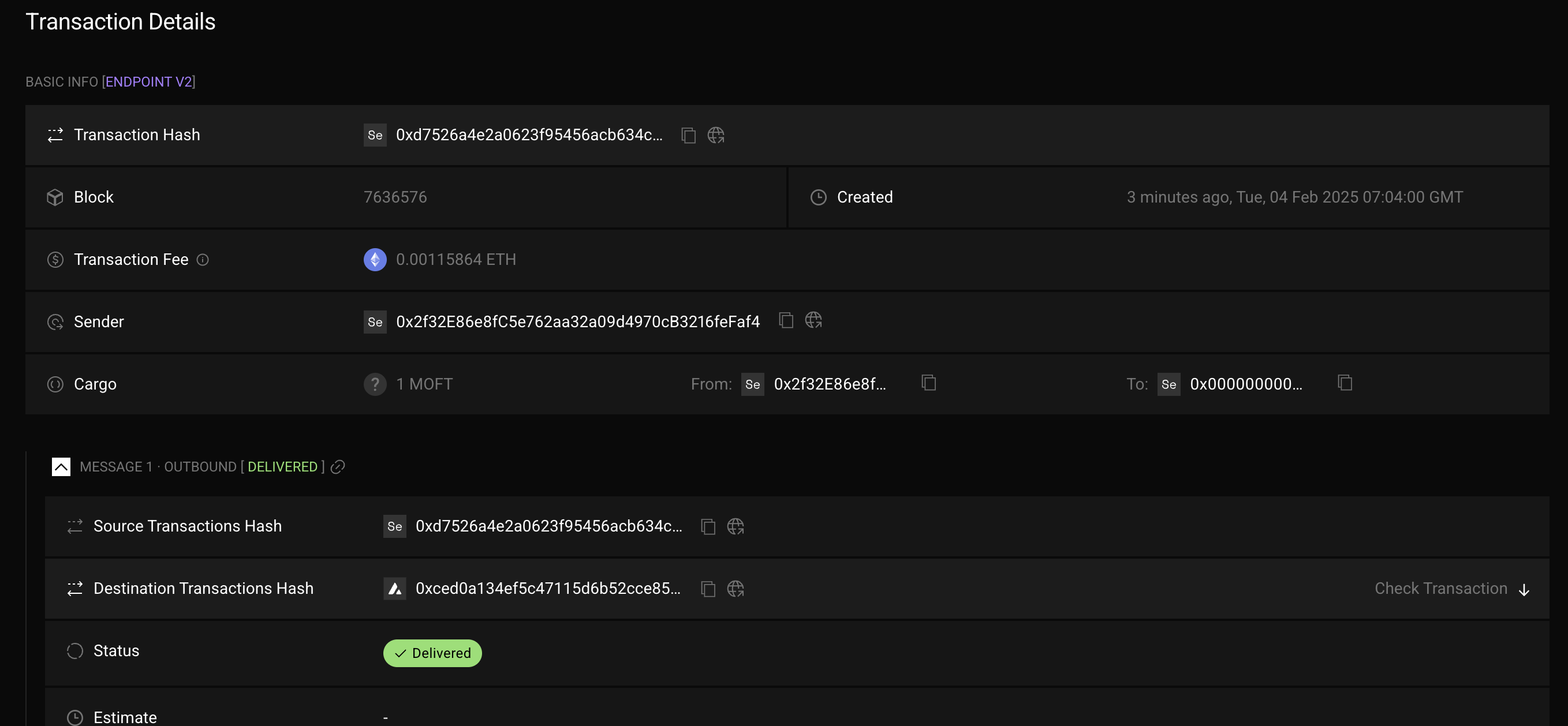
-
실제 Fuji chain에 전송된 것을 확인할 수 있음
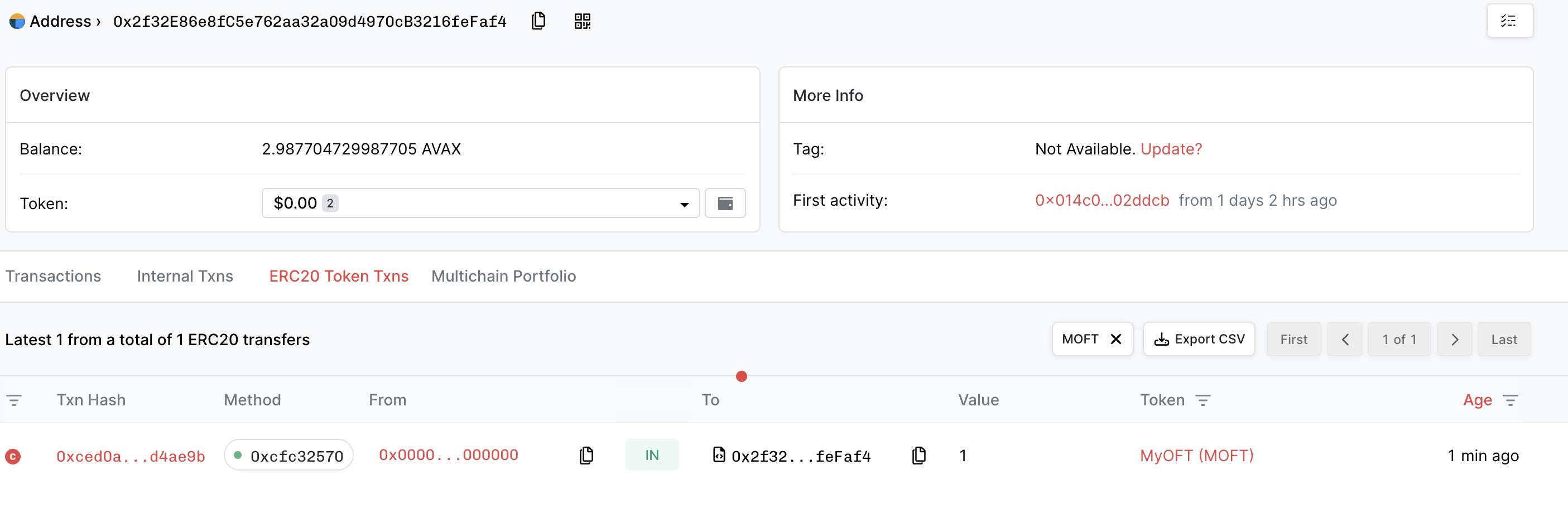
-
Source Chain에서는 send와 함께 Burn 처리됨

-
TroubleShooting
-
Message Blocked
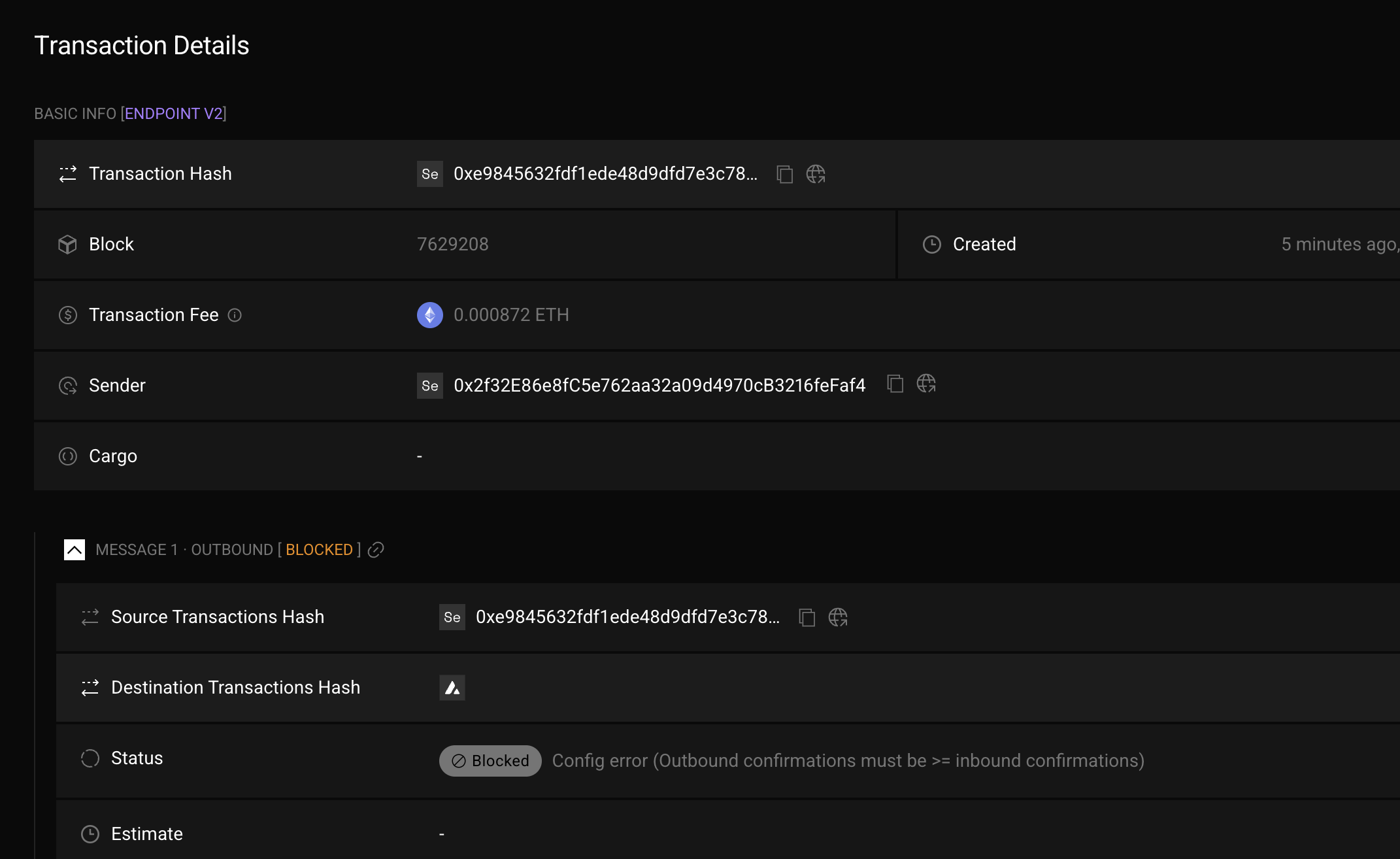
- Config이 잘못되는 경우 Blocked가 되는 경우가 있음
create-lz-oapp을 사용해서 만드는 프로젝트의 기본설정을 사용했는데 그게 문제가 된 것 같음layerzero.config.ts의 connections 부분을 수정- 이상한 옵션을 싹 제거함
connections: [ { from: fujiContract, to: sepoliaContract, }, { from: sepoliaContract, to: fujiContract, } ],
- Config이 잘못되는 경우 Blocked가 되는 경우가 있음